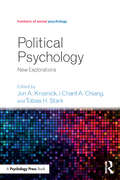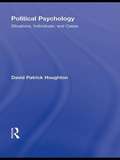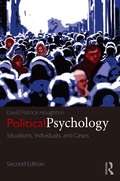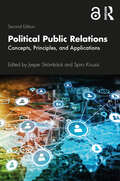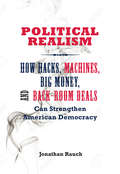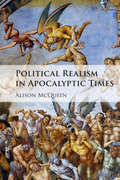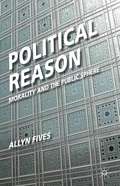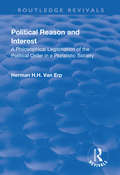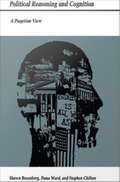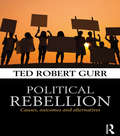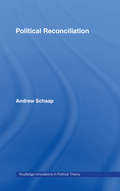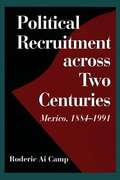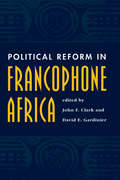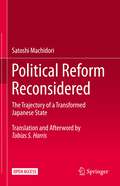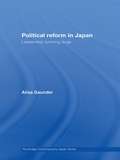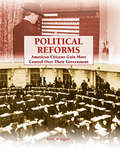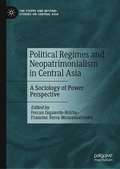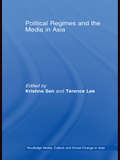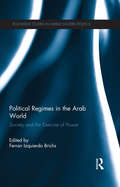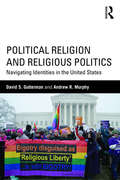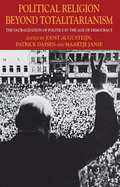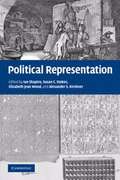- Table View
- List View
Political Psychology: New Explorations (Frontiers of Social Psychology)
by Jon A. Krosnick, I-Chant A. Chiang, and Tobias H. StarkIn recent decades, research in political psychology has illuminated the psychological processes underlying important political action, both by ordinary citizens and by political leaders. As the world has become increasingly engaged in thinking about politics, this volume reflects exciting new work by political psychologists to understand the psychological processes underlying Americans’ political thinking and action. In 13 chapters, world-class scholars present new in-depth work exploring public opinion, social movements, attitudes toward affirmative action, the behavior of political leaders, the impact of the 9/11 attacks, and scientists’ statements about global warming and gasoline prices. Also included are studies of attitude strength that compare the causes and consequences of various strength-related constructs. This volume will appeal to a wide range of researchers and students in political psychology and political science, and may be used as a text in upper-level courses requiring a scholarly and contemporary review of major issues in the field.
Political Psychology: Situations, Individuals, and Cases
by David Patrick HoughtonWhat shapes political behavior more: the situations in which individuals find themselves, or the internal psychological makeup---beliefs, values, and so on---of those individuals? This is perhaps the leading division within the psychological study of politics today. Political Psychology: Situations, Individuals, and Cases, 2nd edition, provides a concise, readable, and conceptually organized introduction to the topic of political psychology by examining this very question. Using this situationism--dispositionism framework--which roughly parallels the concerns of social and cognitive psychology--this book focuses on such key explanatory mechanisms as behaviorism, obedience, personality, groupthink, cognition, affect, emotion, and neuroscience to explore topics ranging from voting behavior and racism to terrorism and international relations. The new edition includes a new chapter on the psychology of the media and communication. Houghton has also updated the text to analyze recent political events such as the 2012 election, and to include up-and-coming research in the areas of neuroscience, behavioral economics, and more. Houghton's clear and engaging examples directly challenge students to place themselves in both real and hypothetical situations which involve intense moral and political dilemmas. This highly readable text will provide students with the conceptual foundation they need to make sense of the rapidly changing and increasingly important field of political psychology.
Political Psychology: Situations, Individuals, and Cases
by David Patrick HoughtonWhat shapes political behavior more: the situations in which individuals find themselves, or the internal psychological makeup---beliefs, values, and so on---of those individuals? This is perhaps the leading division within the psychological study of politics today. Political Psychology: Situations, Individuals, and Cases, 2nd edition, provides a concise, readable, and conceptually organized introduction to the topic of political psychology by examining this very question. Using this situationism--dispositionism framework—which roughly parallels the concerns of social and cognitive psychology—this book focuses on such key explanatory mechanisms as behaviorism, obedience, personality, groupthink, cognition, affect, emotion, and neuroscience to explore topics ranging from voting behavior and racism to terrorism and international relations. The new edition includes a new chapter on the psychology of the media and communication. Houghton has also updated the text to analyze recent political events such as the 2012 election, and to include up-and-coming research in the areas of neuroscience, behavioral economics, and more. Houghton's clear and engaging examples directly challenge students to place themselves in both real and hypothetical situations which involve intense moral and political dilemmas. This highly readable text will provide students with the conceptual foundation they need to make sense of the rapidly changing and increasingly important field of political psychology.
Political Public Relations: Concepts, Principles, and Applications (Routledge Communication Series)
by Jesper Stromback Spiro KiousisThe second edition of Political Public Relations offers an interdisciplinary overview of the latest theory and research in the still emerging field of political public relations. The book continues its international orientation in order to fully contextualize the field amidst the various political and communication systems today. Existing chapters have been updated and new chapters added to reflect evolving trends such as the rise of digital and social media, increasing political polarization, and the growth of political populism. As a singular contribution to scholarship in public relations and political communication, this volume serves as an important catalyst for future theory and research. This volume is ideal for researchers and courses at the intersection of public relations, political communication, and political science.
Political Radicalism in Iran and Ahmadinejad’s Presidencies (Studies in Iranian Politics)
by Giorgia PerlettaThis book offers a critical deconstruction of radicalism as a political category and through this analytical approach seeks to interpret and assess the presidencies of the former Iranian President Mahmud Ahmadinejad. It contextualizes radicalism within a broader framework of Western-derived political categories, which are too frequently used to simplify the complexities of Iran's domestic political landscape, generally reducing any comprehensive and objective understanding of Iranian politics. Since the term radicalism is often misrepresented and misused in readings of contemporary Iran, this study examines several analogous Persian and English labels, exploring their different meanings, significances, and varied applications, in order to challenge any fixed and universal interpretations of radicalism as a concept. The political experience of Mahmud Ahmadinejad, who has been widely perceived as a radical politician, provides an ideal case study in this regard, offering valuable insight into how best to frame and interpret radicalism in post-revolutionary Iran. This book will be of particular interest to both scholars and students of Iranian Studies, but also to more general readers who are broadly interested in Middle Eastern studies, political science, and comparative politics.
Political Realism
by Jonathan RauchA free eBook that asks hard questions about why politics once worked, and how today's politics do not.What if idealistic reform itself is a culprit?In Political Realism, Jonathan Rauch argues that well-meaning efforts to stem corruption and increase participation have stripped political leaders and organizations of the tools they need to forge compromises and make them stick. Fortunately, he argues, much of the damage can be undone by rediscovering political realism. Instead of trying todrive private money away out of politics, how about channeling it to strengthen parties and leaders? Instead of doubling down on direct democracy, how about giving political professionals more influence over candidate nominations? Rauch shows how a new generation of realist thinkers is using timetested truths about politics and government to build reforms for our time.Rich with contrarian insights and fresh thinking, Political Realism is an eye-opening challenge to today's conventional wisdom about what ails American government and politics.
Political Realism in Apocalyptic Times
by Alison McQueenFrom climate change to nuclear war to the rise of demagogic populists, our world is shaped by doomsday expectations. In this path-breaking book, Alison McQueen shows why three of history's greatest political realists feared apocalyptic politics. Niccol- Machiavelli in the midst of Italy's vicious power struggles, Thomas Hobbes during England's bloody civil war, and Hans Morgenthau at the dawn of the thermonuclear age all saw the temptation to prophesy the end of days. Each engaged in subtle and surprising strategies to oppose apocalypticism, from using its own rhetoric to neutralize its worst effects to insisting on a clear-eyed, tragic acceptance of the human condition. Scholarly yet accessible, this book is at once an ambitious contribution to the history of political thought and a work that speaks to our times.
Political Realism, Freud, and Human Nature in International Relations
by Robert SchuettIn the tradition of political realism, this book provides an important reappraisal of the concept of human nature in contemporary realist international-political theory. With special reference to the anthropology of Sigmund Freud, a consequential yet terribly neglected and underestimated thinker in International Relations, Schuett demonstrates that analytical and normative theorizing of all international-political reality, its nature, tragedies, and potentialities, requires a sophisticated theory of human nature. Developing a Freudian philosophical anthropology for political realism, he argues for the careful resurrection of the concept of human nature in the wider study of international relations.
Political Reason
by Allyn FivesIn modern democracies, existing moral pluralism conflicts with a commitment to resolve political disputes by way of moral reasoning. Given this fact, how can there be moral resolutions to political disputes and what type of reasoning is appropriate in the public sphere? Fives explores this by closely analysing the work of MacIntyre and Rawls.
Political Reason and Interest: A Philosophical Legitimation of the Political Order in a Pluralistic Society
by Herman H.H. ErpThis title was first published in 2000: Politics cannot be conceived of as just a subsystem of society, or as a network of particular interests. The concept of interests and their role within the normative political debate is given a new interpretation by this book, which examines how political interest, market mechanisms and rational choice theories exist in the light of democratic freedom and social justice. The book builds on different concepts of procedural justice, from Schumpeter, Buchanan and Habermas’s conceptions of democracy and the role of political compromise and coalition in the idea of consensus as a condition for political legitimation.
Political Reason in the Age of Ideology: Essays in Honor of Raymond Aron
by Daniel MahoneyA little over one hundred years after his birth, and not quite twenty-five years since his death, interest in the French political philosopher and sociologist Raymond Aron (1905-1983) continues to grow. Aron is now widely recognized as one of the most significant intellectual figures of the postwar period, whose wide-ranging reflections played a key part in preserving liberal democracy in Europe and abroad. His sober analyses of modern society, his trenchant critique of ideological politics and every form of totalitarianism, and his philosophical reflections on politics and history have given powerful support to democratic liberalism throughout the western world. Aron's work combines passion and observation, disinterested reflection and love of liberty in a way that is an imitable model for humane and balanced political reflection.In this stimulating collection of essays, inspired by the centennial of Aron's birth, a distinguished group of North American and European scholars including Pierre Manent, Stanley Hoffmann, Irving Louis Horowitz, Liah Greenfeld, Claude Lefort, and Aurelian Craiutu examine four key aspects of Aron's thought and work: his educative legacy; his reflections on other philosophers and intellectuals; his distinctive approach to international relations; and the unique character of his own political reflection. The result is a masterful engagement with Aron's intellectual legacy and a thoughtful coming to terms with the political and intellectual substance of the twentieth century.
Political Reasoning and Cognition
by Shawn W. Rosenberg Dana Ward Stephen ChiltonThis work presents a new, alternative approach to studying the formation of political ideologies and attitudes, addressing a concern in political science that research in this area is at a crossroads. The authors provide an epistemologically grounded critique on the literature of belief systems, explaining why traditional approaches have reached the limits of usefulness. Following the lead of such continental theorists such as Jurgen Habermas and Anthony Giddens, who stress the importance of Jean Piaget to the development of a strong theoretical perspective in political psychology, the authors develop a different epistemology, theory,and research strategy based on Piaget, then apply it in two emperical studies of belief systems, and finally present a third theoretical study of political culture and political development.
Political Rebellion: Causes, outcomes and alternatives
by Ted Robert GurrThis volume comprises key essays by Ted Robert Gurr on the causes and consequences of organized political protest and rebellion, its outcomes and strategies for conflict management. From the Castro-inspired revolutionary movements of Latin America in the 1960s to Yugoslavia’s dissolution in ethnonational wars of the 1990s, and the popular revolts of the Arab Spring, millions of people have risked their lives by participating in protests and rebellions. Based on half a century of theorizing and social science research, this book brings together Gurr’s extensive knowledge and addresses the key questions surrounding this subject: - What grievances, hopes and hatreds motivated the protesters and rebels? - What did they gain that might have offset myriad deaths and devastation? - How effective are protest movements as alternatives to rebellions and terrorism? -What public and international responses lead away from violence and toward reforms? The essays in the volume are updated and are organized around the evolving themes of the author's research, including theoretical arguments, interpretations and references to the evidence developed in his empirical research and case studies. The concluding essays bring theory and evidence to bear on the past and future of political violence in Africa. This book will be of much interest to student of rebellion, political violence, conflict studies, security studies and IR.
Political Reconciliation (Routledge Innovations in Political Theory #Vol. 15)
by Andrew SchaapSince the end of the Cold War, the concept of reconciliation has emerged as a central term of political discourse within societies divided by a history of political violence. Reconciliation has been promoted as a way of reckoning with the legacy of past wrongs while opening the way for community in the future.This book examines the issues of transitional justice in the context of contemporary debates in political theory concerning the nature of 'the political'. Bringing together research on transitional justice and political theory, the author argues that if we are to talk of reconciliation in politics we need to think about it in a fundamentally different way than is commonly presupposed; as agonistic rather than restorative.
Political Recruitment across Two Centuries: Mexico, 1884-1991
by Roderic Ai CampDuring more than twenty years of field research, Roderic Ai Camp built a monumental database of biographical information on more than 3,000 leading national figures in Mexico. In this major contribution to Mexican political history, he draws on that database to present a definitive account of the paths to power Mexican political leaders pursued during the period 1884 to 1992. Camp's research clarifies the patterns of political recruitment in Mexico, showing the consequences of choosing one group over another. It calls into question numerous traditional assumptions, including that upward political mobility was a cause of the Mexican Revolution of 1910. Comparing Mexican practices with those in several East Asian countries also allows Camp to question many of the tenets of political recruitment theory. His book will be of interest to students not only of Mexican politics but also of history, comparative politics, political leadership, and Third World development.
Political Reform In Francophone Africa
by John F ClarkMost African states experienced only a few fleeting years of democratic rule after independence before succumbing to authoritarianism. During the 1970s and 1980s, Africans and Westerners alike came to view dictatorship to be as much a part of the region's social landscape as its grinding poverty. Yet the end of the Cold War and the sharpening of the economic crisis at the end of the 1980s have breathed new life into campaigns for democracy in Africa, shaking the foundations of many long-standing autocracies. In some cases, dramatic transitions took place, though the fate of the new democracies is far from certain.This volume explores the origins and evolution of political reform movements in several states of Francophone Africa. The authors first make the case for the distinctiveness of Francophone Africa, based on the influences of colonial history, language, and France's contemporary role in Africa, then survey the challenges of reform, including the problems of transition from authoritarianism and consolidation of democratic regimes. Case studies of thirteen former French and Belgium colonies follow, organized by level of reform achieved: peaceful regime change, incremental reforms, repressed reform efforts, and reform in the mist of war.
Political Reform Reconsidered: The Trajectory of a Transformed Japanese State
by Satoshi MachidoriThis Open Access book provides a comprehensive analysis of political reforms in Japan since the 1990s, emphasizing the role of ideas in shaping their goals and outcomes. For more than fifteen years following the collapse of Japan’s economic bubble, politicians, business people and academics tackled a range of institutional reforms. The sweeping changes they enacted—covering almost all facets of the public sphere, including elections, public administration, courts and the central bank—fundamentally altered Japanese political processes and policies. Taken together, they arguably represent the final touches of Japan’s political modernization, which had been unfolding since the mid-19th century. Throughout the reform process, advocates were inspired by a combination of liberal and modernist ideas. This book examines those guiding concepts and illustrates the often messy process of applying them to real-world institutions. While most reforms began from common goals, they ultimately produced different—and frequently unexpected—institutional outcomes, which continue to shape Japanese politics. By focusing on the relationship between the ideas and processes that shaped Japan’s reforms, this book presents a broad vision of institutional change in comparative politics.
Political Reform in Japan: Leadership Looming Large (Routledge Contemporary Japan Series #Vol. 12)
by Alisa GaunderPolitical Reform in Japan argues that the quality of political leadership is the crucial determinant of whether parties in positions of dominance, like the Liberal Democratic Party in Japan, pass or reject policies such as electoral system and campaign finance reforms that could harm the party's future electoral chances. By comparing successful reform drives led by Miki Takeo, Ozawa Ichiro and Koizumi Junichiro with unsuccessful reform efforts pursued by Kaifu Toshiki, Miyazawa Kiichi and Kono Yonhei, Alisia Gaunder forces a reconsideration of the structure versus agency debate in political science, and of the conventional wisdom on Japanese politics that consensus decision-making norms and factional power balancing produce little in the way of political leadership.
Political Reforms: American Citizens Gain More Control Over Their Government (The Progressive Movement, 1900-1920--efforts To Reform America's New Industrial Society Ser.)
by Katherine WingateAmerica's industrial revolution revealed the close ties between big business and the government that allowed a select few to gain power and riches over those struggling to make a living. The progressives believed the only way to empower disenfranchised individuals was to reform the political process. Here Wingate describes the initiatives taken by the progressives to force local and state legislatures to allow more political power to the people rather than government and business.
Political Regimes and Neopatrimonialism in Central Asia: A Sociology of Power Perspective (The Steppe and Beyond: Studies on Central Asia)
by Ferran Izquierdo-Brichs Francesc Serra-MassansalvadorThis book is aimed both at researchers and advanced students of Central Asia, the space of the former USSR, and the foreign policy of Russia and China. The authors adopt a sociological approach in understanding how power structures emerged in the wake of the Soviet collapse. The independencies in Central Asia did not happen as a consequence of a nationalist struggle, but because the USSR imploded. Thus, instead of the elites being replaced, the same Soviet elites who had competed for power in the previous system continued to do so in the new one, which they had to build, adapting themselves and the system to their needs. Additionally, unlike in the immense majority of the independent states that emerged from decolonization, the social movements and capacity to mobilize the people were very weak in the new Central Asian states. For this reason, the configuration of the new systems was the product of a competition for power between a very small number of elites who did not have to answer to the people and their demands. Thus, the new power regimes acquired a strong neopatrimonial component. Analyzing the structure of societies, economies and polities of post-socialist states, this book will be of great interest to scholars of Central Asia, to sociologists, and to scholars of China's rise.
Political Regimes and the Media in Asia (Media, Culture and Social Change in Asia)
by Terence Lee Krishna SenThis book analyzes the relationship between political power and the media in a range of nation states in East and Southeast Asia, focusing in particular on the place of the media in authoritarian and post-authoritarian regimes. It discusses the centrality of media in sustaining repressive regimes, and the key role of the media in the transformation and collapse of such regimes. It questions in particular the widely held beliefs, that the state can have complete control over the media consumption of its citizens, that commercialization of the media necessarily leads to democratization, and that the transnational, liberal dimensions of western media are crucial for democratic movements in Asia. Countries covered include Burma, China, Indonesia, Malaysia, Singapore, Thailand, the Philippines and Vietnam.
Political Regimes in the Arab World: Society and the Exercise of Power (Routledge Studies in Middle Eastern Politics)
by Ferran Izquierdo BrichsOne of the implications of Orientalism is that the Arab world, as a homogenous entity, is often analysed as an anomaly within the international system. This book argues that, despite their differences, societies across the globe ultimately construct their own history according to very similar dynamics and tensions. The methodological approach of this book, using different countries within the Arab world as models, offers the reader an analysis of relations between the elites and their opposition in a variety of settings. A definition of the political structure of each country is drawn from this analysis before potential future scenarios, as according to country specific experts, are proposed. This model provides a useful contribution to students and scholars of political science and international relations. Through providing a comparative study of the political regimes currently operating in the Arab world; their elites, civil society, power resources and political resistance, this book illustrates that despite the image of homogeneity sometimes portrayed by the Arab world, it is the multiplicity of models and heterogeneity of regimes that constitute reality.
Political Religion and Religious Politics: Navigating Identities in the United States (Routledge Series on Identity Politics)
by Andrew R. Murphy David S. GuttermanProfound demographic and cultural changes in American society over the last half century have unsettled conventional understandings of the relationship between religious and political identity. The "Protestant mainline" continues to shrink in numbers, as well as in cultural and political influence. The growing population of American Muslims seek both acceptance and a firmer footing within the nation’s cultural and political imagination. Debates over contraception, same-sex relationships, and "prosperity" preaching continue to roil the waters of American cultural politics. Perhaps most remarkably, the fastest-rising religious demographic in most public opinion surveys is "none," giving rise to a new demographic that Gutterman and Murphy name "Religious Independents." Even the evangelical movement, which powerfully re-entered American politics during the 1970s and 1980s and retains a strong foothold in the Republican Party, has undergone generational turnover and no longer represents a monolithic political bloc. Political Religion and Religious Politics:Navigating Identities in the United States explores the multifaceted implications of these developments by examining a series of contentious issues in contemporary American politics. Gutterman and Murphy take up the controversy over the "Ground Zero Mosque," the political and legal battles over the contraception mandate in the Affordable Health Care Act and the ensuing Supreme Court Hobby Lobby decision, the national response to the Great Recession and the rise in economic inequality, and battles over the public school curricula, seizing on these divisive challenges as opportunities to illuminate the changing role of religion in American public life. Placing the current moment into historical perspective, and reflecting on the possible future of religion, politics, and cultural conflict in the United States, Gutterman and Murphy explore the cultural and political dynamics of evolving notions of national and religious identity. They argue that questions of religion are questions of identity -- personal, social, and political identity -- and that they function in many of the same ways as race, sex, gender, and ethnicity in the construction of personal meaning, the fostering of solidarity with others, and the conflict they can occasion in the political arena.
Political Religion beyond Totalitarianism
by Joost Augusteijn Patrick Dassen Maartje JanseThe success of fascist and communist regimes has long been explained by their ability to turn political ideology into a type of religion. These innovative essays explore the notion that all forms of modern mass-politics, including democracies, need a form of sacralization to function.
Political Representation
by Ian Shapiro Susan C. Stokes Elisabeth Jean Wood Alexander S. KirshnerPolitical representation lies at the core of modern politics. Democracies, with their vast numbers of citizens, could not operate without representative institutions. Yet relations between the democratic ideal and the everyday practice of political representation have never been well defined and remain the subject of vigorous debate among historians, political theorists, lawyers, and citizens. In this volume, an eminent group of scholars move forward the debates about political representation on a number of fronts. Drawing on insights from political science, history, political theory, economics, and anthropology, the authors provide much-needed clarity to some of the most vexing questions about political representation. They also reveal new and enlightening perspectives on this fundamental political practice. Topics discussed include representation before democracy, political parties, minorities, electoral competition, and ideology. This volume is essential reading for anyone interested in the ideal and the reality of political representation.
